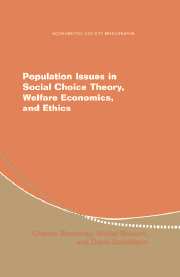Book contents
- Frontmatter
- 1 Introduction
- 2 Measurement of Individual Well-Being
- 3 Welfarist Social Evaluation
- 4 Fixed-Population Principles
- 5 Population Principles
- 6 Characterizations and Possibilities
- 7 Uncertainty and Incommensurabilities
- 8 Independence of the Existence of the Dead
- 9 Temporal Consistency
- 10 Choice Problems and Rationalizability
- 11 Applications
- References
- Author Index
- Subject Index
5 - Population Principles
Published online by Cambridge University Press: 05 January 2013
- Frontmatter
- 1 Introduction
- 2 Measurement of Individual Well-Being
- 3 Welfarist Social Evaluation
- 4 Fixed-Population Principles
- 5 Population Principles
- 6 Characterizations and Possibilities
- 7 Uncertainty and Incommensurabilities
- 8 Independence of the Existence of the Dead
- 9 Temporal Consistency
- 10 Choice Problems and Rationalizability
- 11 Applications
- References
- Author Index
- Subject Index
Summary
Part A
In this chapter, we introduce population principles and explore their properties. Because the principles that we consider are both welfarist and anonymous, each one can be defined by a single anonymous ordering of utility vectors (see Chapter 3). We follow standard practice and normalize utilities so that a utility level of zero represents neutrality.
Most population principles have value functions that represent their social evaluation orderings. If a value function exists, utility vector u is at least as good as utility vector v if and only if the value associated with u is no less than the value associated with v.
Our investigation uses same-number extensions of fixed-population axioms such as Pareto weak preference and continuity and additional axioms that apply to population principles alone. We prove, in Chapter 6, that there is no population principle that satisfies all our axioms. It is possible, however, to find ethically attractive population principles that satisfy some of them.
We present and examine the critical-level generalized utilitarian class, the restricted critical-level generalized utilitarian class, the number-sensitive critical level generalized utilitarian class, the restricted number-sensitive critical-level generalized utilitarian class, the number-dampened generalized utilitarian class (Ng 1986), and the restricted number-dampened generalized utilitarian class (Hurka 2000). All these principles rank alternatives with the same population size using generalized utilitarianism. In addition, each class contains a subclass whose members rank same-number alternatives with utilitarianism. In addition to the above classes of principles, we consider variable-population extensions of maximin and leximin as well as classes of principles that have been suggested by Carlson (1998) and Sider (1991).
- Type
- Chapter
- Information
- Publisher: Cambridge University PressPrint publication year: 2005



